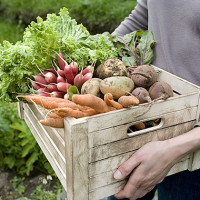
Planting holes should be dug wide enough and deep enough to comfortably accept the roots of the plant.
Submitted Photo
If you have even a glimpse of a thought or fantasy of brightening your horizon, surroundings, mood or even garden, do take advantage of bare root rose and fruit tree sales going on right now at both Sonoma Mission Gardens and Wedekind’s Garden Center.
Now that you have recovered from the holidays, hopefully, gardening is an excellent way to clean out your physical system, either your body, garden or other immediate environment. Roses can be grown in pots or half wine barrels if you don’t have a garden.
“Playing in the dirt,” as our kids call my gardening endeavors, is great for the soul and great exercise. There is lots to do and it’s even easier with the soft gooey soil we might enjoy after hefty rains.
Pruning to make beautiful roses and fruit trees
It’s time to prune your roses and fruit trees. Remember when you cut back the roses to always cut at the same angle as a strong bud pointing outward, with the goal of leaving the ball at the center of the plant open to sunlight. I guarantee more and stronger colored flowers if you do this, even without fertilizers.
To learn more about pruning your fruit trees, you can learn a lot at the Sonoma Garden Park’s “hands-on fruit tree pruning class” this Saturday, Jan. 12 from 1 to 3 p.m. If it rains, the class will be Jan. 19 instead.
Held in conjunction with the Sonoma Ecology Center, Wendy Krupnick will teach the class, “How, Why and When to Prune.” Krupnick coordinated the educational market garden at Santa Rosa Junior College’s Shone Farm for seven years.
Guests are encouraged to bring their own pruning tools. $15-$20 benefits the Sonoma Garden Park at the late Pauline Bond’s ranch at 19990 Seventh St. E. between MacArthur and Denmark. For more information, visit www.sonomaecologycenter.org.
Gift plants: what to do
If you were as lucky as I was this holiday season and received a potted plant, from azaleas to hydrangeas and cyclamen (lots of those around), help them transition from your warm home to their natural home outdoors by putting them in a sheltered spot, such as a covered porch, before planting them in a couple of weeks.
Living Christmas trees and Hanukkah bushes need to be watered and moved slowly outdoors as well. The shock of going straight from the warmth of decorative lights in a living room to a frosty spot in the middle of your lawn or elsewhere can be too much. We learned this the hard way about 20 years ago, and the whole family felt as if we had failed the tree horribly. It was hard to get over.
We can still plant begonia, dahlia, gladiolus and other bulbs for summer blooming. In our planter made with probably creosote-coated railroad ties more than 20 years ago, creating a micro-climate facing eastward, our daffodils are on the verge of blooming.
About six weeks ago I planted some dahlia “bulbs” (which look more like petrified dead spiders than what most of us know as bulbs) that I had purchased two years ago in a bag at Costco, and they are coming up early along with the daffies. Both local nurseries have good supplies.
Bare roots
There are a couple of reasons to buy bare root roses and fruit trees now: 1) Both are much less expensive than buying them later in pots. 2) Nurseries offer many more varieties and choices in bare root. 3) Winter is the ideal time to plant bare roots because the weather gives the plants the opportunity to put their energy into subterranean root development while they are not expending it to put out leaves, flowers and fruit. Then when it’s time to foliate and bloom, they have a strong foundation and a friendly root neighborhood from which to grow.
Some plant folks encourage spraying bare roots to deter bugs, and some nurseries have already done it. Personally, I never spray either our roses or fruit trees, and subscribe to the late Master Nurseryman Frank Wedekind’s theory and method of “water is the best spray” if and when the bugs show up.
Seeds
If you have seed trays, which resemble large, deep ice trays, you can plant seeds in them and place them in front of a window to start tomato plants and other veggies.
Winter vegetables
Lettuces, broccoli, cauliflower, kale, spinach and chard will produce your own healthy meals, and Jolly Green Goddess highly encourages the use of organic seeds, seedlings and starter plants, although they might suffer a slightly higher casualty rate than the chemically preserved varieties.
Local citrus
Enjoy your or your neighbors’ fabulous lemons while they last!
Get down! Get dirty!






